Bedford Highlanders
Out and About
Places > Bedford > First World War > Regiments | Bedford Highlanders Home
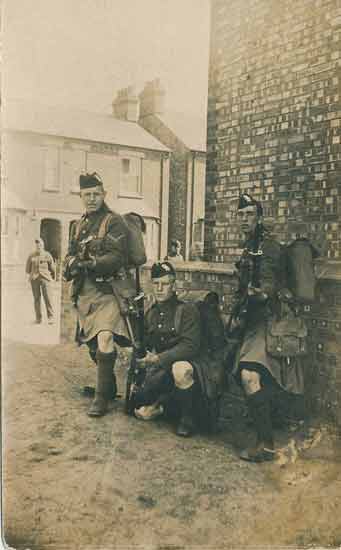 In April 1915, the Highland Division was reinforced with two battalions of Royal Highlanders (the ‘Black Watch’). These men of either the 6th, or 7th Black Watch
pose for the camera in Coventry Road, Bedford where they were billeted.
In April 1915, the Highland Division was reinforced with two battalions of Royal Highlanders (the ‘Black Watch’). These men of either the 6th, or 7th Black Watch
pose for the camera in Coventry Road, Bedford where they were billeted.
Coventry Road is in the Queens Park area which had been the main billeting district for the Gordon Highlanders during the first couple of months of the Division's
occupation of the town. In the autumn of 1914, the Gordons moved closer to the town centre within the area of Lansdowne Road/ Warwick Avenue/ Bromham Road and the
'Poets' quarter.
(photo: courtesy of Richard Galley)
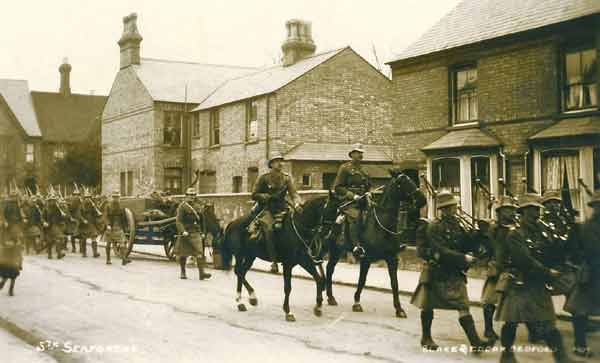 The 5th Seaforth Highlanders on the march down Stanley Street, Bedford, with the pipes and drums leading the way. The men are wearing Glengarry covers which
suggests that this photograph may have been taken shortly before the Highland Division left Bedford on active service.
The 5th Seaforth Highlanders on the march down Stanley Street, Bedford, with the pipes and drums leading the way. The men are wearing Glengarry covers which
suggests that this photograph may have been taken shortly before the Highland Division left Bedford on active service.
(photo: courtesy of Richard Galley)
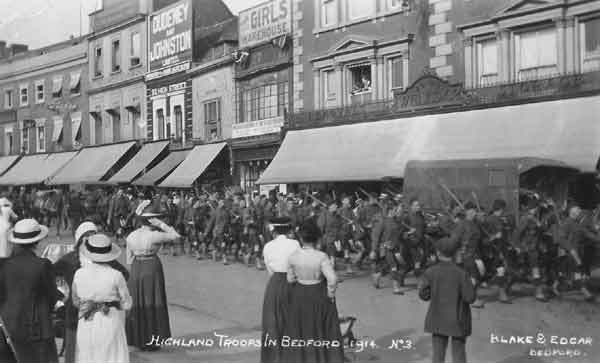 Summer 1914 and everyone stops to watch as the 4th Cameron Highlanders march through St Paul's Square, Bedford. At this time, the Highlanders were still
something of a novelty in the town and, in truth, they remained so throughout their 9 month occupation.
Summer 1914 and everyone stops to watch as the 4th Cameron Highlanders march through St Paul's Square, Bedford. At this time, the Highlanders were still
something of a novelty in the town and, in truth, they remained so throughout their 9 month occupation.
This photograph is one of a series taken by Blake and Edgar on the same day, although interestingly the numbers on the negatives appear to be out of sequence given
the route that the soldiers appear to be following.
The fashions and shop fronts may have changed and the soldiers have disappeared into history, but the view today is remarkably unaltered after 100 years.
(photo: courtesy of Richard Galley)
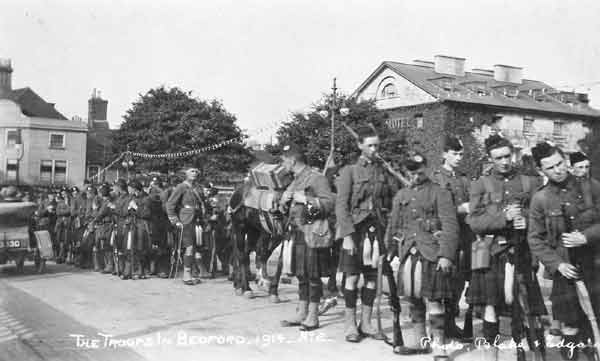 A bit further on in the sequence the 4th Camerons are photographed at the halt on Bedford's town bridge, with the Swan Hotel in the background. While the men at
the head of the group are wondering what's holding things up, the men towards the rear are far more interested in the motor car which is making its way across the
bridge towards the town centre.
A bit further on in the sequence the 4th Camerons are photographed at the halt on Bedford's town bridge, with the Swan Hotel in the background. While the men at
the head of the group are wondering what's holding things up, the men towards the rear are far more interested in the motor car which is making its way across the
bridge towards the town centre.
The men are in full marching order with their rifles and packs. The pack horses carry boxes of equipment and supplies.
In February 1915 the battalion was detached from the Highland Division and left Bedford for France. On 17 May 1915 the men seen in this and the other photographs
were in action for the first time at the battle of Festubert. With a battalion of the Bedfordshire Regiment alongside them, they were ordered to assault the German
lines across 800 yards of open ground. They eventually reached their objective and held it until 18 May when they were forced to withdraw when their position
became untenable. During this action the Camerons lost 9 officers (including their Commanding Officer, Lieutenant Colonel Alexander Fraser) and 108 men killed and
4 officers and 126 men wounded.
(photo: courtesy of Richard Galley)
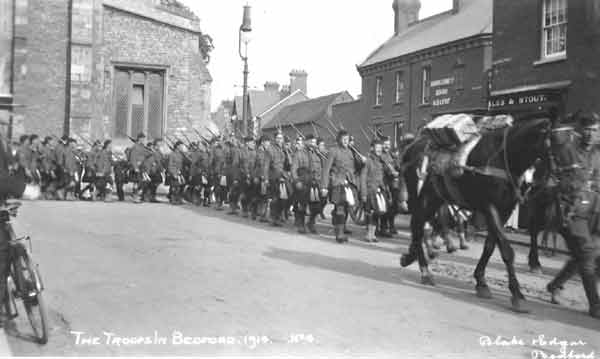 Back on the move, the 4th Camerons have crossed the town bridge and are seen turning from St Mary’s Street into Cauldwell Street. St Mary's church is in the
background.
Back on the move, the 4th Camerons have crossed the town bridge and are seen turning from St Mary’s Street into Cauldwell Street. St Mary's church is in the
background.
(photo: courtesy of Richard Galley)
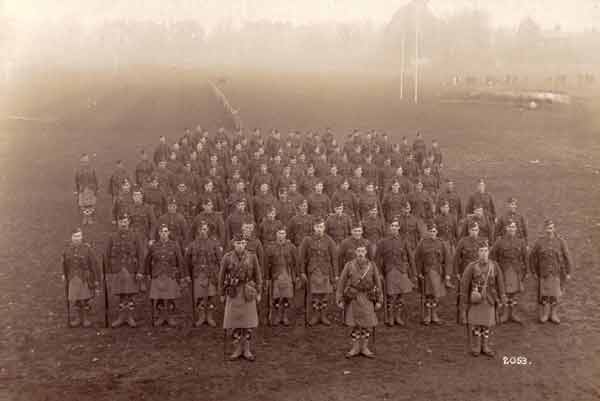 F Company, 4th Seaforth Highlanders photographed on Bedford Grammar School playing fields shortly before departing for the Front on 5 November 1914.
F Company, 4th Seaforth Highlanders photographed on Bedford Grammar School playing fields shortly before departing for the Front on 5 November 1914.
In the misty background it is possible to make out a game of rugby being played and in the far distance stands the School chapel and houses marking the school
estate's boundary with Pemberley Avenue.
The Battalion had performed well in the early days of training and was already almost up to its fighting complement when the Highland Division was asked to release
some of its units early to help reinforce the hard pressed British Expeditionary Force in France and Belgium, the 4th Seaforth was an obvious choice.
Once the first line battalion had left Bedford, its place was taken by the second line battalion, 2/4th Seaforth, made up of men who were not fit enough, or of
fighting age to go on active service, or the very few who, as Territorial soldiers, exerted their then right not to be sent overseas to fight. The second line
battalion prepared drafts of new recruits for active service feeding the first line battalion with replacements for men who became casualties in the fighting on the
Western Front.
The officers standing in front of their men are, from left to right:
Lieutenant Fitzroy, Captain Forsyth (Company Commander) Lieutenant Hope
Michael Algernon Fitzroy was the son of Captain the Honourable Edward Algernon Fitzroy, M.P. and the Honourable Mrs Edward Fitzroy CBE, Fox Hill, West Haddon,
Northamptonshire. He was killed in action on 15th April 1915 from a shot to the head, aged 19 years and is buried at Caberet-Rouge British Cemetery, Souchez.
(photo: courtesy of Richard Galley)
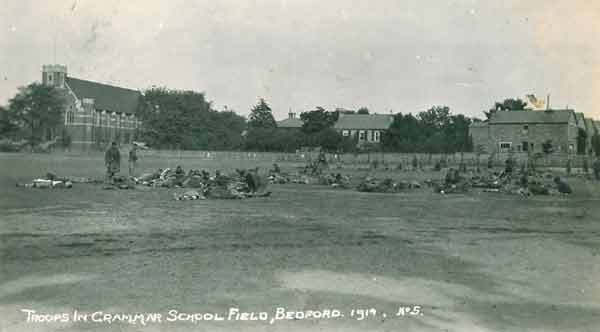 Shortly
after the Highlanders' arrival in town, Blake and Edgar's photographer captured this image of men of the 4th Seaforth Highlanders relaxing in the summer
sun on Bedford Grammar School's playing field, with the school chapel in the background.
Shortly
after the Highlanders' arrival in town, Blake and Edgar's photographer captured this image of men of the 4th Seaforth Highlanders relaxing in the summer
sun on Bedford Grammar School's playing field, with the school chapel in the background.
The School served as Battalion Head Quarters for the 4th Seaforth and in the early days of its stay in town the School’s class rooms provided sleeping quarters for
some of the men.
The men are positioned just in front of the school's northern facade and the camera is facing east with Burnaby Road behind the photographer's back and houses on
Glebe Road visible in the far right background of the picture.
This post card was sent from Bedford to a Mrs. D Lamont of 36, Montague Street, Rothesay, Bute, Scotland and the message reads:
"Arrived here alright. It is very warm down here not like Bute at all. I will send you word when I see a little more about. Hope Daniel is keeping better.
Johnnie"
(photo: courtesy of Richard Galley)
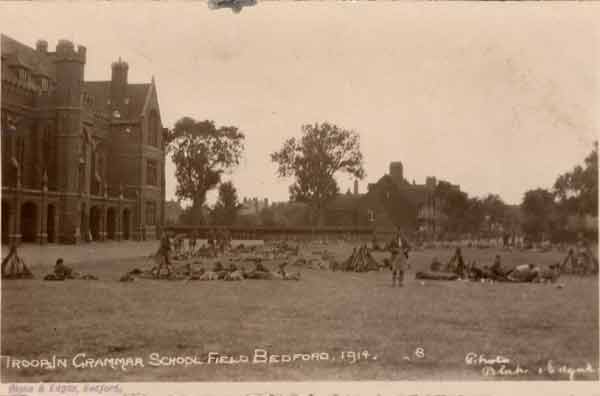 The photographer has repositioned and captured the scene from the other side, facing west with Burnaby Road in the middle distance.
The photographer has repositioned and captured the scene from the other side, facing west with Burnaby Road in the middle distance.
The school's northern façade appears on the left handside of the picture.
Bedford Grammar School became Bedford School in 1919 and this scene is little changed today despite the school building being gutted by fire in the late 1970s
after which the interior was rebuilt within the original shell.
(photo: courtesy of Bedford and Luton Archives and Records Service)
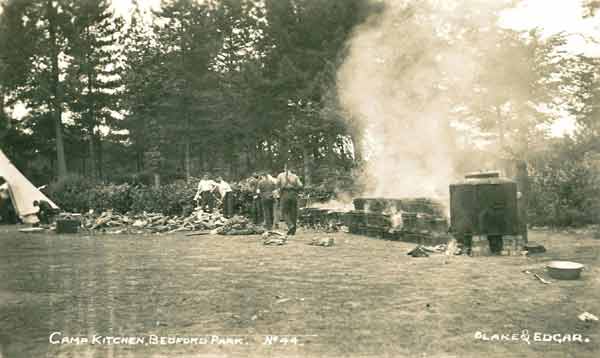 Seaforth Highlanders field kitchen in Bedford Park on the boundary with Park Avenue, circa late summer 1914.
Seaforth Highlanders field kitchen in Bedford Park on the boundary with Park Avenue, circa late summer 1914.
The cooks are tending the boiling dixies and an ample supply of wood has just been chopped to keep the fires stoked. The word 'dixie' is said to be derived from the
Hindi word 'degchi' meaning cooking pot.
"The march in companies armed with plates and tins was quite a local attraction.
Boiled potatoes and stew was the menu, and it smelt appetising"
The Bedfordshire Times and Independent 21/8/14
(photo: courtesy of Richard Galley)
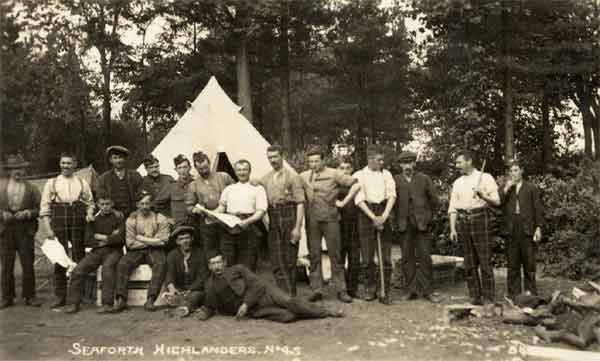 The Seaforth cooks and local men pose for Blake and Edgar's camera in Bedford Park. Wood has been chopped to keep the fires fuelled under the simmering dixies
which are out of shot on the right hand side of the photo.
The Seaforth cooks and local men pose for Blake and Edgar's camera in Bedford Park. Wood has been chopped to keep the fires fuelled under the simmering dixies
which are out of shot on the right hand side of the photo.
(photo: courtesy of Bedford and Luton Archives and Records Service)
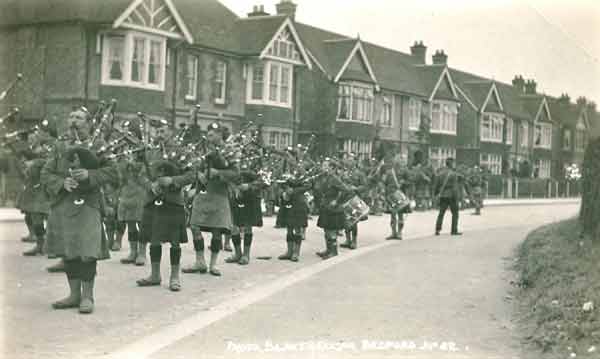 The pipes and drums of a battalion of the Argyll and Sutherland Highlanders stand playing at the junction of Shaftesbury Avenue and Kingsley Road. The boundary
with Russell Park is on the right of the picture and the photograph was taken looking south down Shaftesbury Avenue towards The Embankment.
The pipes and drums of a battalion of the Argyll and Sutherland Highlanders stand playing at the junction of Shaftesbury Avenue and Kingsley Road. The boundary
with Russell Park is on the right of the picture and the photograph was taken looking south down Shaftesbury Avenue towards The Embankment.
Behind the band, infantrymen are either preparing to start, or have just completed a route march.
(photo: courtesy of Richard Galley)
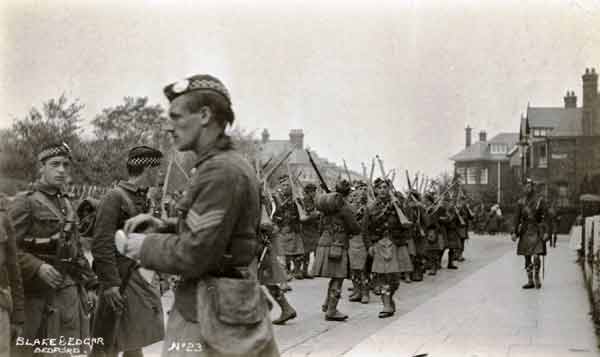 After capturing the image of the Argyll and Sutherland's pipes and drums in Shaftesbury Avenue, the photographer turned his attention to this group of men.
The picture shows the soldiers drawn up in Shaftesbury Avenue between the junction with The Embankment (behind the photographer's back) and Kingsley Road
(on the right of the picture in the middle distance).
After capturing the image of the Argyll and Sutherland's pipes and drums in Shaftesbury Avenue, the photographer turned his attention to this group of men.
The picture shows the soldiers drawn up in Shaftesbury Avenue between the junction with The Embankment (behind the photographer's back) and Kingsley Road
(on the right of the picture in the middle distance).
The message on the reverse of the card reads:
"23 December 1914 - Bedford
Dear Sarah,
Received your letter today. Glad to see by it you are well as this leaves me well. We are just getting home after a 16 mile march. We left at 9 o’clock and did not
get home till 5 o’clock when we got our dinner.
John
Miss Sarah White
Millhouse,
Kyles of Bute,
Argyllshire"
(photo: courtesy of Bedford and Luton Archives and Records Service)
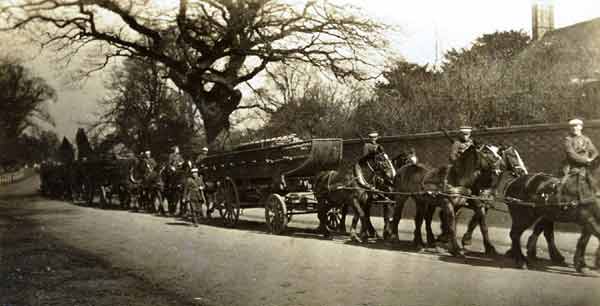 Believed to have been taken in the area of Cardington Road/ Duck Mill Lane, Bedford, this photograph shows a column of the Highland Field Company, Royal
Engineers with elements of a pontoon bridge. The soldiers are engaged in a military exercise, or 'war game', and wear white bands around their hats to indicate
which side they are on.
Believed to have been taken in the area of Cardington Road/ Duck Mill Lane, Bedford, this photograph shows a column of the Highland Field Company, Royal
Engineers with elements of a pontoon bridge. The soldiers are engaged in a military exercise, or 'war game', and wear white bands around their hats to indicate
which side they are on.
(photo: courtesy of Bedford and Luton Archives and Records Service)
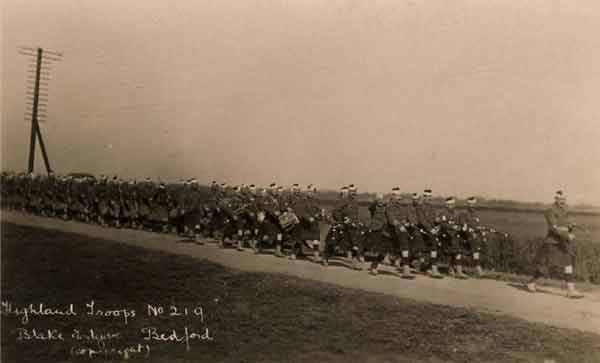 A column of Highland infantry involved in 'war game', somewhere on the outskirts of Bedford. They wear white bands around their hats to indicate which side they
belong to. The field exercises and route marches took the kilted troops out into the countryside around Bedford and as a result the people living in the rural areas
and also got to know and befriend the soldiers.
A column of Highland infantry involved in 'war game', somewhere on the outskirts of Bedford. They wear white bands around their hats to indicate which side they
belong to. The field exercises and route marches took the kilted troops out into the countryside around Bedford and as a result the people living in the rural areas
and also got to know and befriend the soldiers.
(photo: courtesy of Bedford and Luton Archives and Records Service)
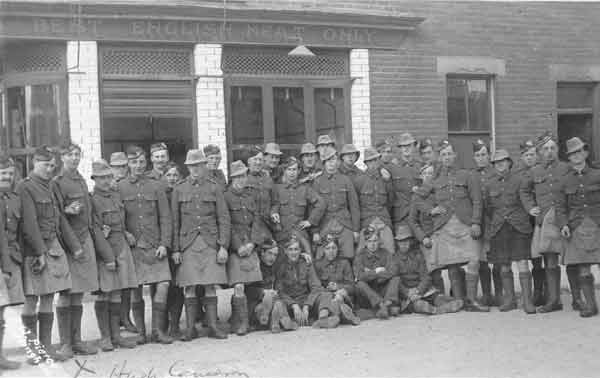 Off-duty
5th Seaforth Highlanders captured by the camera on the corner of Gladstone Street at the junction with Stanley Street.
Off-duty
5th Seaforth Highlanders captured by the camera on the corner of Gladstone Street at the junction with Stanley Street.
(photo: courtesy of Mr. R. Reid)
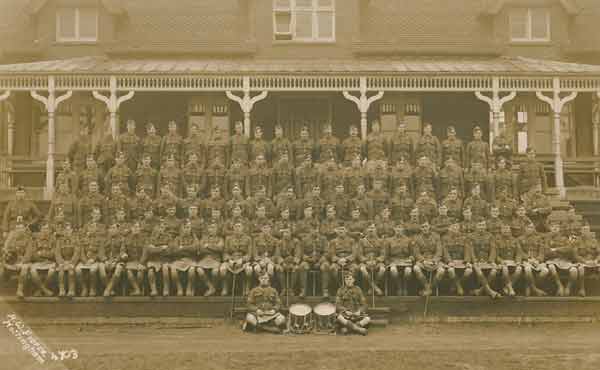 A company
of the 6th Seaforth Highlanders posing on the tiered seating of Bedford Grammar School's cricket pavilion – a popular spot for photographs during the
Highlanders' time in the Town.
A company
of the 6th Seaforth Highlanders posing on the tiered seating of Bedford Grammar School's cricket pavilion – a popular spot for photographs during the
Highlanders' time in the Town.
(photo: courtesy of Richard Galley)
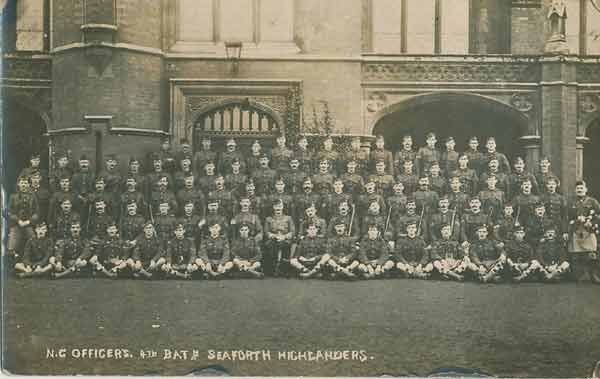 Shortly before they depart for the Front, the officers and NCOs of the 4th Seaforth Highlanders pose in front of Bedford (Grammar) School's north façade.
The doorway behind the group leads into the Great Hall which provided sleeping accommodation for some of the soldiers in the first weeks of the battalion's stay in
Bedford, the school itself serving as HQ for the Seaforth and Cameron Brigade.
Shortly before they depart for the Front, the officers and NCOs of the 4th Seaforth Highlanders pose in front of Bedford (Grammar) School's north façade.
The doorway behind the group leads into the Great Hall which provided sleeping accommodation for some of the soldiers in the first weeks of the battalion's stay in
Bedford, the school itself serving as HQ for the Seaforth and Cameron Brigade.
(photo: courtesy of Richard Galley)
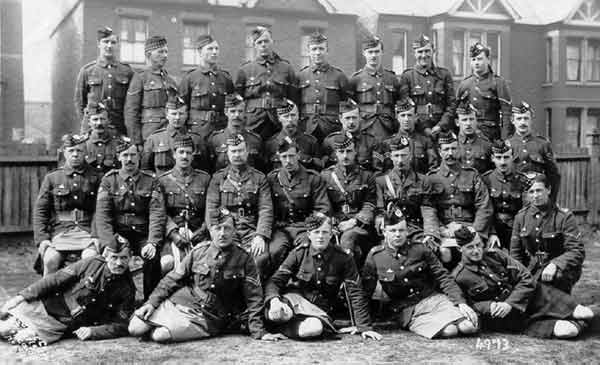 Officers and NCOs of the 5th Gordon Highlanders posing for the camera in Hurst Grove. The Gordons were billeted in Queens Park and Beverley Crescent when they
first arrived in town, but moved closer to the town centre (Lansdowne Road / Warwick Avenue / Conduit Road area) later in 1914. The photo was taken in what was then
the garden of the Allens Club. It's now the junction of Henley Road and Hurst Grove. The prominent houses in the background are Nos. 76, 78 & 80.
Officers and NCOs of the 5th Gordon Highlanders posing for the camera in Hurst Grove. The Gordons were billeted in Queens Park and Beverley Crescent when they
first arrived in town, but moved closer to the town centre (Lansdowne Road / Warwick Avenue / Conduit Road area) later in 1914. The photo was taken in what was then
the garden of the Allens Club. It's now the junction of Henley Road and Hurst Grove. The prominent houses in the background are Nos. 76, 78 & 80.
(photo: courtesy of Mr. Alastair Davidson)
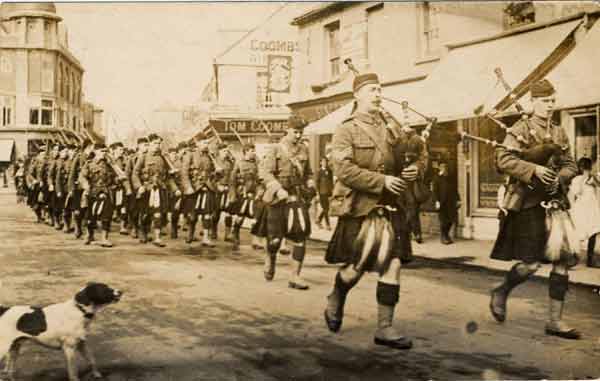 The 4th Camerons on the march in Midland Road heading towards what is now the Harpur Centre and what was then Bedford Modern School. In the background, on the
left, the familiar landmark of Longhurst & Skinner, now The Pilgrim’s Progress pub. Not all the natives were friendly, as the Pipe Sergeant might be about to
find out!
The 4th Camerons on the march in Midland Road heading towards what is now the Harpur Centre and what was then Bedford Modern School. In the background, on the
left, the familiar landmark of Longhurst & Skinner, now The Pilgrim’s Progress pub. Not all the natives were friendly, as the Pipe Sergeant might be about to
find out!
(photo: courtesy of Bedford and Luton Archives and Records Service)
Whilst in Bedford serving with the 5th Seaforth Highlanders, Lt. E.A. Mackintosh wrote the following poem in honour of the 4th Camerons as they departed the town
for active service in February 1915.
CHA TIL MACCRUIMEIN (Departure of the 4th Camerons)
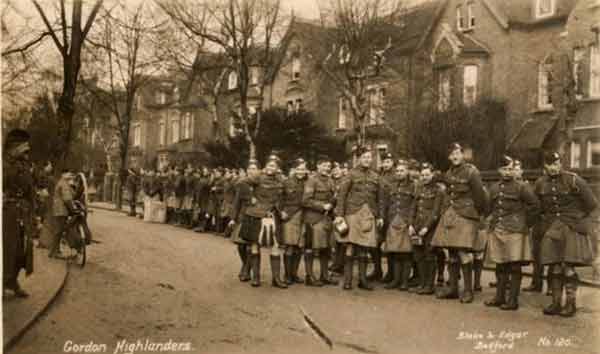 Gordon Highlanders in Lansdowne Road.
Gordon Highlanders in Lansdowne Road.
(photo: courtesy of Bedford and Luton Archives and Records Service)
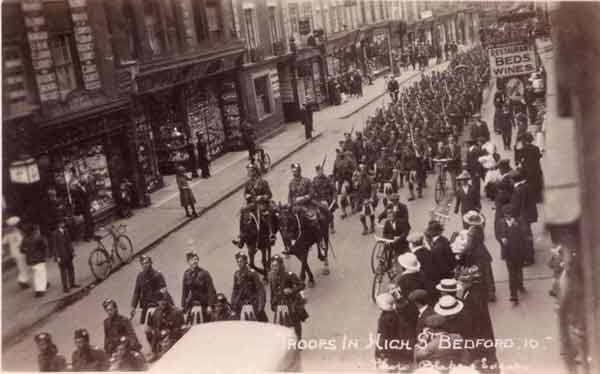 Gordon Highlanders marching along the High Street, Bedford and the townsfolk stop what they are doing to watch the procession pass by. The novelty of seeing
the Highlanders in and around town never really paled in the 9 months of the Division’s occupation of the Town and county.
Gordon Highlanders marching along the High Street, Bedford and the townsfolk stop what they are doing to watch the procession pass by. The novelty of seeing
the Highlanders in and around town never really paled in the 9 months of the Division’s occupation of the Town and county.
(photo: courtesy of Richard Galley)
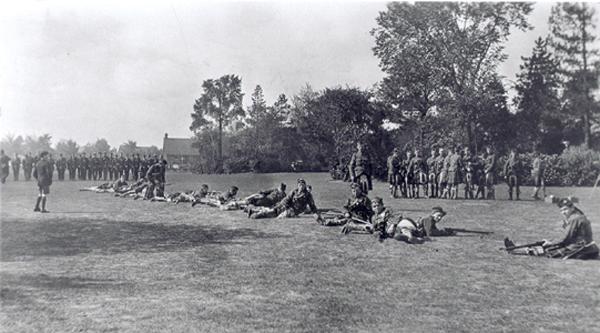 Seaforth
Highlanders (either 4th or 6th Battalion) in Bedford Park. An area used by the Seaforth and Cameron Brigade for training. The soldiers lying down in the foreground are
engaged in rifle drill using blank rounds.
Seaforth
Highlanders (either 4th or 6th Battalion) in Bedford Park. An area used by the Seaforth and Cameron Brigade for training. The soldiers lying down in the foreground are
engaged in rifle drill using blank rounds.
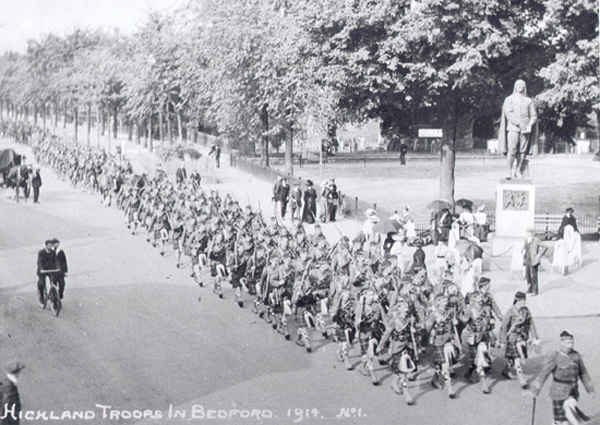 Seaforth
Highlanders (either 4th or 6th Battalion) marching down De Parys and into the High Street, in the Summer of 1914. The photograph was taken from the upper storey or roof
of Porter Blacks (a tea room at the time) on the corner of the High Street and Dame Alice Street.
Seaforth
Highlanders (either 4th or 6th Battalion) marching down De Parys and into the High Street, in the Summer of 1914. The photograph was taken from the upper storey or roof
of Porter Blacks (a tea room at the time) on the corner of the High Street and Dame Alice Street.
Page last updated: 10th July 2014
